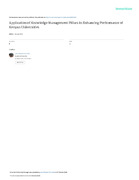| dc.description.abstract | Data are simple, discrete facts and figures such as names, characteristics and amounts. Information is more complex, for it organizes data for a meaningful purpose. Data might be a table of circulation statistics, but once those statistics are arranged or organized in a meaningful way to describe trends in library use, they become information. According to Davenport and Prusak, knowledge is a fluid mix of framed experience, values, contextual information and expert insight that provides a framework for evaluating and incorporating new experience and information. It originates and is applied in the minds of those who know. In organizations, it often becomes embedded not only in documents and repositories but also in organizational routines, processes, practices, and norms. While data and information are in a sense bound objects, knowledge is a process, a dynamic, or an ability to understand and to share understanding. There is need for institutions of higher learning to consider the creation of knowledge management (KM) departments which enhance the application of KM elements into the institutional processes. This paper endeavors to identify the need for application and integration of KM pillars for organizational success. Through non-probability sampling, the author observed issues relating to applicability of KM pillars in Kenyan universities, besides analyzing statements in journals, print and electronic documents on this subject. The discussions show the current KM status is still not exploited in Kenyan universities. The main aspects found include current proposals with regard to information and communication technology infrastructure, harnessing and preserving knowledge, knowledge and skills development in the context of KM. The author suggests ways of enhancing the efficiency and effectiveness of KM pillars in the performance of Kenyan universities. | en_US |
